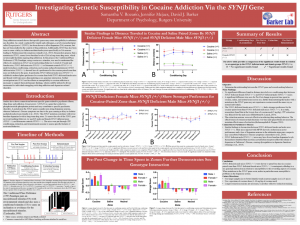Rozario, Samantha: Investigating Genetic Susceptibility in Cocaine Addiction Via the SYNJ1 Gene
Title: Investigating Genetic Susceptibility in Cocaine Addiction Via the SYNJ1 Gene
Name: Samantha Rozario
Major: Biological Sciences
School affiliation: School of Environmental and Biological Sciences
Programs: Aresty Summer Science Program
Other contributors: Jennifer Mejaes and David J. Barker
Abstract: Drug addiction research shows that specific genes may cause susceptibility to substance use disorders. In a study conducted by Quadri and colleagues, a newly researched gene called Synaptojanin 1 (SYNJ1), has been shown to affect dopamine (DA) neurons, but has not been studied in the context of drug addiction. Additionally, SYNJ1 has also been seen to cause a delay in clathrin-mediated endocytosis specifically in DA neurons leading to Parkinsonian-like symptoms (Quadri et al., 2013). Researchers propose that a mutation in SYNJ1, causes lower baseline levels of DA in long-term drug users, which in turn might facilitate ongoing drug addiction. In this project, the Conditioned Place Preference (CPP) Paradigm, using cocaine as a stimulus, was used to understand the effects of a mutation in SYNJ1 on reward-seeking behavior. A total of 23 male and female mice, SYNJ1 deficient mice SYNJ1(+/-) or littermate controls SYNJ1 (+/+) underwent place conditioning, extinction, and cocaine-induced reinstatement. SYNJ1 deficient mice SYNJ1(+/-) showed less of a preference for the cocaine-paired zone than mice not deficient in the gene. In particular, SYNJ1 deficient male mice SYNJ1(+/-) exhibited a reduced place preference for cocaine than both SYNJ1 deficient female mice and female wild-type mice, demonstrating a sex-genotype interaction. Further investigation into SYNJ1 and its effects on susceptibility to cocaine addiction is necessary to support these preliminary findings, which could be utilized to devise treatments for individuals struggling with drug addiction and dopamine-related disorders.
